Sunday Read: How hard can it be?
As it turns out running a Covid Field Hospital in New York City was actually pretty hard
A unique moment in time
On this Easter I wanted to tell you about a story of heroes coming together to save their fellow Americans. I hope you are having a happy day if you celebrate.
Three years ago today I was packing my car to head to New York City as the outbreak of COVID-19 decimated the city. The entire country had locked down by then but New York was suffering the worst of the crisis with densely packed communities and high occupancy dwellings taking the worst of this new and deadly virus.
By April 6, the city had accumulated 72,181 confirmed COVID-19 cases, with at least 2,475 deaths, nearly 25% of the US total to that date. I was sitting at home with my public relations firm managing several veterans non-profit clients trying to adjust to this new reality when a fateful call came in from a friend, Kate Kemplin, the former wife of a fallen Navy SEAL and nursing instructor in Canada. She was driving to New York City for a truly revolutionary mission and needed help.
Two days later I was heading north on an all but empty I-95 to join her, dozens of Special Operations veteran medical personnel, civilian doctors, and nurses to build a COVID Field Hospital on the campus of Columbia University’s athletic complex.
Bub, that’s you.
The idea came from the collaboration of three brilliant women. Dr. Laureen Hill, the chief operating officer of New York Presbyterian/Columbia University Irving Medical Center had secured space for a field hospital in Columbia University’s Baker Field House athletic “bubble” but didn’t have staff. She connected with just retired Army Colonel (Dr.) Missy Givens who understood that Governor Cuomo’s emergency orders meant that former military medical personnel could practice under the supervision of licensed doctors and nurses. She told Dr. Hill if she could provide the hospital, she would provide the people, and with Kate onboard as Chief of Nursing the call went out to special operations veterans across the country to go to New York.
As they all made their way to the city it became clear they needed more than just medical personnel. Kate called me asking if I knew anyone in my network who could quickly show up and project manage construction, establish a personnel management system, oversee human resources like pay, hiring, firing, food services, and general logistics for what was essentially a military unit deploying to combat. I promised to see who I could think of and called my girlfriend to tell her about his interesting effort.
As I laid out the job description Heather was like, “bub, that’s you.” Her point wasn’t wrong. I had a lot of management experience in difficult circumstances after 22-years as an Army officer and a decade as a CEO. I had led the staff of an assault helicopter battalion in combat, built a small company, and was a deeply experienced crisis manager.
“Shit, you’re right.”
I called Kate back and asked if they would take me. Approval came down that night and I packed my bags to head north. My family thought I was insane but they also understood that after volunteering to return to the Army after 9/11, running to the sound of the guns was kind of my thing. We waved goodbye from the balcony of my townhouse and I drove to the city.
How hard can it be?
As I drove north on the all but abandoned roads of America, Heather and I discussed the task I faced. She has deep experience in the medical field. I did not. She asked if I had dealt with many doctors or nurses professionally? Had I worked in a hospital? Have I ever interacted with the administrative aspects of the medical system?
Nope, but, “How hard can it be?”
“Oh, you dear sweet summer child,” she replied.
I arrived on Friday, April 10th and found a frantic effort to build a fully functional, robust, and first class temporary hospital inside the inflatable bubble over Columbia’s practice soccer field that would include a full oxygen farm hard plumbed to over 200 beds. It was a magnificent effort all occurring in under a week from approval to deadline to open to relieve New York Presbyterian’s eight hospitals overflowing with COVID patients, exhausted staff, and dwindling space.
A talented former Air Force Major from Long Island had been handling the project management for three days but had to return to his day job the next week. By the end of the day we decided I would serve as the Administrative Chief of Staff handling everything outside the bubble while Missy, Kate, and their growing team of medical professionals would manage everything inside treating patients.
It was like climbing aboard a rocket to the moon as it came off the pad.
I was quickly up to my ears in all of the aspects of manning a hospital for a highly contagious disease we barely understood. Everything from building a proper roster of the staff, ensuring they were trained in how to wear the ‘bunny suits’, payroll processing, housing, monitoring NYP’s construction, and on and on.
Even worse, Missy made me shave my beard so the N-95 masks we wore around patients would be snug. It was traumatizing.
The reality of it all hit me on Monday when one of my team grabbed me from the athletics conference room we had taken over as our office to tell me that the NYP leadership wanted to see me in the bubble. I arrived to find a squad of construction managers and hospital senior staff arrayed in a circle.
“Okay, Fred, we’re done. We want to show you around and have you sign for the hospital.”
Inside my head I issued a scream along the lines of “WWWWWWHHHHAAAATTT!!!????” On the outside I said, “Great.” Off we went.
Guard the place but be nice about it
The next day, I stood outside the bubble as our first ambulances arrived carrying patients with my operations partner from NYP. The thing about a positive pressure facility is that the doors act as essentially an air lock. Only one set of doors can be open at a time or the air rushes out and with it, a faceful of COVID virus particles. The crew dropped off the first patient and as the second was entering the air lock one of the first attendants remembered she had left something behind and grabbed the second set of doors leading to frantic scramble to stop her.
My colleague and I looked at each other both realizing we were missing a key staff member. I needed door guards and I needed them now.
I turned to the same source I often turned to in these moments. Fellow veterans. With in person classes suspended and students working from home there was a pool of bored personnel available. We had picked up a couple of Columbia student veterans already helping with driving the shuttle buses back and forth from the hotel to the hospital.
With a couple of calls a motivated young veteran who ran the Columbia Veterans Association named Rachel Ballew was in my office. I told her I needed 24/7 shifts of two guards to ground guide ambulances and make sure no one was barging into our hospital. I needed it by tomorrow. That night we had an entire roster and plan. Military people get shit done.
After a day or so I went down to do my usual ‘management by walking around’ shift of the bubble. I had two former Marines on duty at the doors. As an ambulance backed up one of the young men began barking commands and “counseling” the driver for backing up the wrong way.
As he stepped out of his ambulance I saw the hollow eyes of pure exhaustion beneath his goggles and full bunny suit. These crews had been going for two weeks or more in a city nearly falling apart and warming up. We heard stories of them entering apartments to find elderly folks barely breathing next to their dead spouses. Treating whole families suffering from this terrible illness. Continuous shifts while facing a growing number of their own peers catching the disease and succumbing themselves.
On top of that we discovered that there were rumors among the NYP hospital patient population that if they were moved from the hospital to Larkin, it was to die. Instead of being a step down unit meant to help them recover, open beds, and provide nearly one-on-one care they were scared it was to ease them to the end. They were calling it ‘the dome of death.’
No one in those ambulances needed anyone yelling at them as they arrived.
So, I had to do the hardest thing imaginable. I had to teach a bunch of young former Marines to be nice while on guard duty. We were going to be ‘Officer Friendly’ at Larkin. We had the staff set up a table of snacks and coolers with cold drinks and established a simple set of guidelines. We welcome them. We thank them. We support them. If needed we gently correct any mistakes to meet safety protocols.
As I fully expected my fellow veterans responded to the new guidelines without blinking an eye and we became the happy place.
All ship’s need a bell
During those frantic early days Missy mentioned she would love to get a bell that patients can ring as they leave the hospital like the tradition in oncology wards at the end of chemo and treatment. Coincidentally, the Navy has a long tradition of ringing a ship’s bell at the end of a watch, for the arrival and departure of VIP’s, changes of command, and other ceremonies. It seemed like a perfect symbol for a hospital named after a Navy SEAL but we needed the right kind of bell.
Our namesake, Ryan Larkin, was a Navy SEAL Corpsman who had deployed to combat four times and and in a terrible tragedy took his own life on April 23, 2017 as a result of traumatic brain injuries and PTSD. His father, Frank Larkin, is a legendary Navy SEAL himself as well as intelligence officer and former Senate Sergeant-at-Arms. After losing Ryan he and his family have become instrumental in advocacy for research into TBI and its treatment.
We had to honor the families legacy properly. We had to have a Navy bell.
After extensive research (a Google search) I found a company in North Carolina that made authentic Navy ship bells and could engrave them…in just a few weeks. I didn’t have weeks. I called and when I told them our story the nice folks at A Simpler Time had our engraved bell enroute the very next day.
When I told the support team at New York Presbyterian what we had in mind they were thrilled to help. Their own in house carpenters swung into action and built us a custom stand to place the bell just outside the entrance to the bubble.
Frank Larkin came to see what his son’s fellow veterans had built in his name on April 23rd. I had seen Frank speak about his son’s loss not long after he took his life at a conference. The impact on me of the trauma of his loss was the final straw that made me realize my own PTSD and suicidal ideations were destroying my life and led me to finally go into intense therapy. That day remains one of the most important days of my life.
I was able to tell him there and we all went down to the bubble and Frank was the first person to ring the New York Presbyterian Ryan F. Larkin Field Hospital bell. He would be the first of many as within days we would regularly hear the beautiful sound of the bell ringing as patients left us to go home.
Turning the lights out
The thing about crisis management is almost as soon as you get things running smoothly it’s time to start shutting it down. That early phase of COVID was no different and by late April we were preparing for the next phase. My plan had only been to spend a couple of weeks in New York. When Missy came to me to give me the order to develop a shut down plan I asked if she wanted me to go ahead and hand off my duties as well, she looked at me aghast. “No! I was hoping you’d be here to turn the lights out.”
So, I let my employees and family know I would stay in New York for another few weeks. They all stepped up and supported my desire to serve. As they always did.
There are simply too many stories to tell about Larkin. I could fill a book on it alone. The long list of incredible people who stepped into the breach and what they have done since from Ricky Ditzel, a young veteran now writing papers and protocols on emergency field medical operations, to Rebekah Maciorowski, a then brand new nurse who joined us and has now been serving as a volunteer frontline medic under fire in Ukraine for months.
From the incredibly brilliant three women who led the effort to the grizzled old retired Navy Master Chief they recruited as our “Senior NCO” and chief of safety for the command team, Steve Viola. He spent a lot of time talking me down off the ceiling with his easy going charm.
One of the smartest moves they made as they built our team was the addition of social workers to support the staff and patients. Some of the hardest moments of that time for me was listening to them cry in my office trying to process the stories they were hearing inside the bubble. The stories of immigrants and working class folks many of whom barely spoke English. How do you talk to an elderly man who was terrified to go home because his wife had died in their apartment and when he was rescued by NYFD he had to leave their four cats behind? He was afraid of what he would find alone in that apartment after weeks in the hospital.
With time it’s easy to forget those devastating early days. We were located next to New York Presbyterian Allen Hospital and it served as sort of our parent hospital. On April 27th the shocking news came in that the head of emergency medicine there, Dr. Lorna Breen had taken her life. Her family said the toll of seeing so much suffering and being unable to do more to help had just overwhelmed her. I saw medical professionals broken to tears.
All of them are heroes. When the call went out they put away their lives and flew into the center of the storm. They put on full hazmat suits and went into a virus zone to fight a disease we were still learning about each day.
I processed their paperwork and made sure their lives outside of that bubble were comfortable. There is a famous quote by legendary 101st Airborne World War II veteran, and subject of the book and series ‘Band of Brothers,’ Major Dick Winters that I turn to often.
“One day my grandson said to me, grandpa were you a hero in the war? And i said to him no I'm not a hero, but I have served in a company full of them.”
I had the privilege to serve with a company of heroes in New York City at the start of a global pandemic like nothing we have seen in a hundred years.
Authors Note:
Happy Easter to all who celebrate. I will be spending it surrounded by my children and grandchildren. I hope you are surrounded by friends and family as well.
I will be announcing a number of new initiatives for this growing community this week that I hope you will love. Keep you eyes out for our next Chat session and I hope you’ll join the discussion. Elon continues to tinker with Twitter so I hope you will share this newsletter with your friends and consider upgrading to paid subscription. Everything will be available to free subscribers this month but your support means I can do this work right.
Scouts Out!
Fred



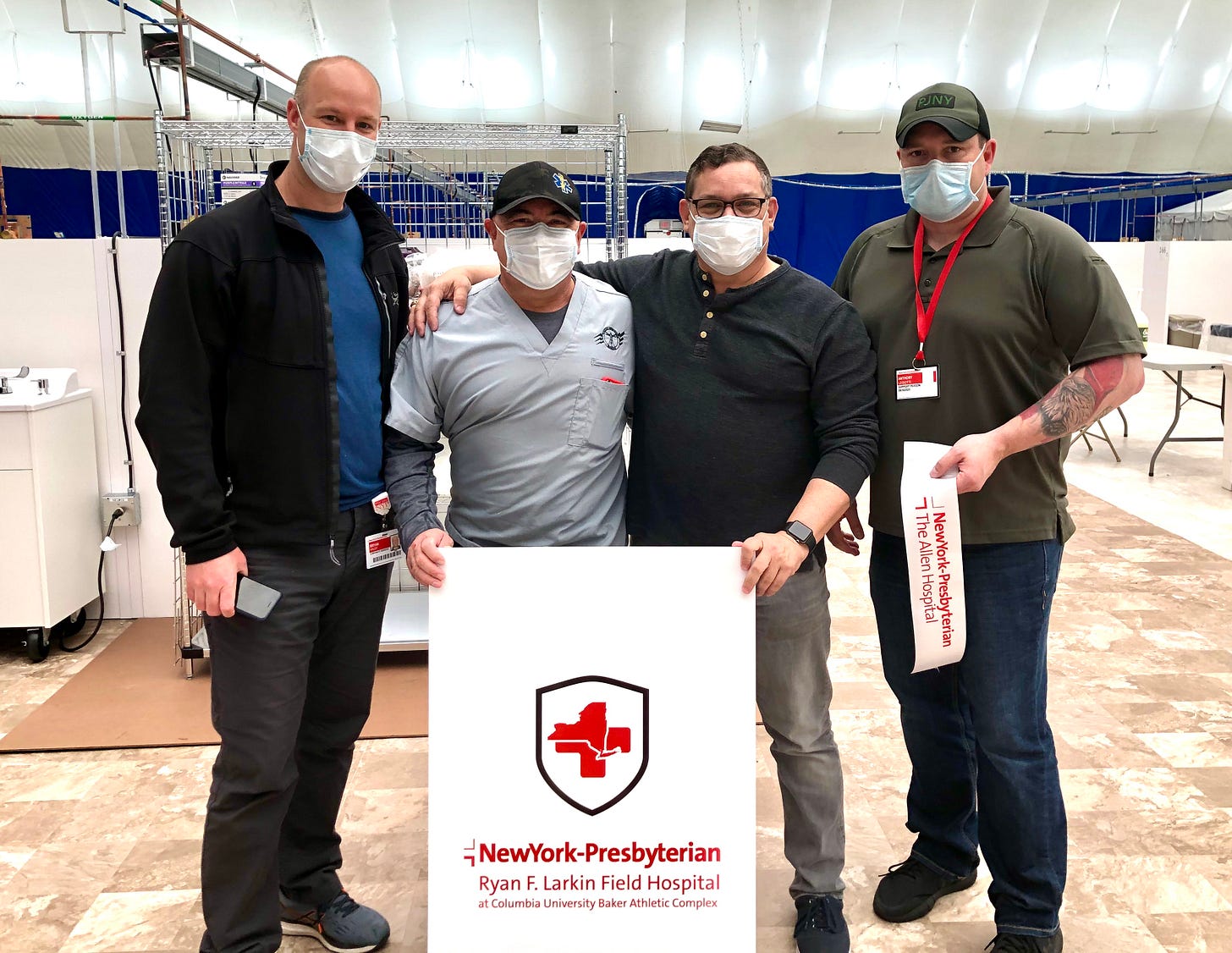
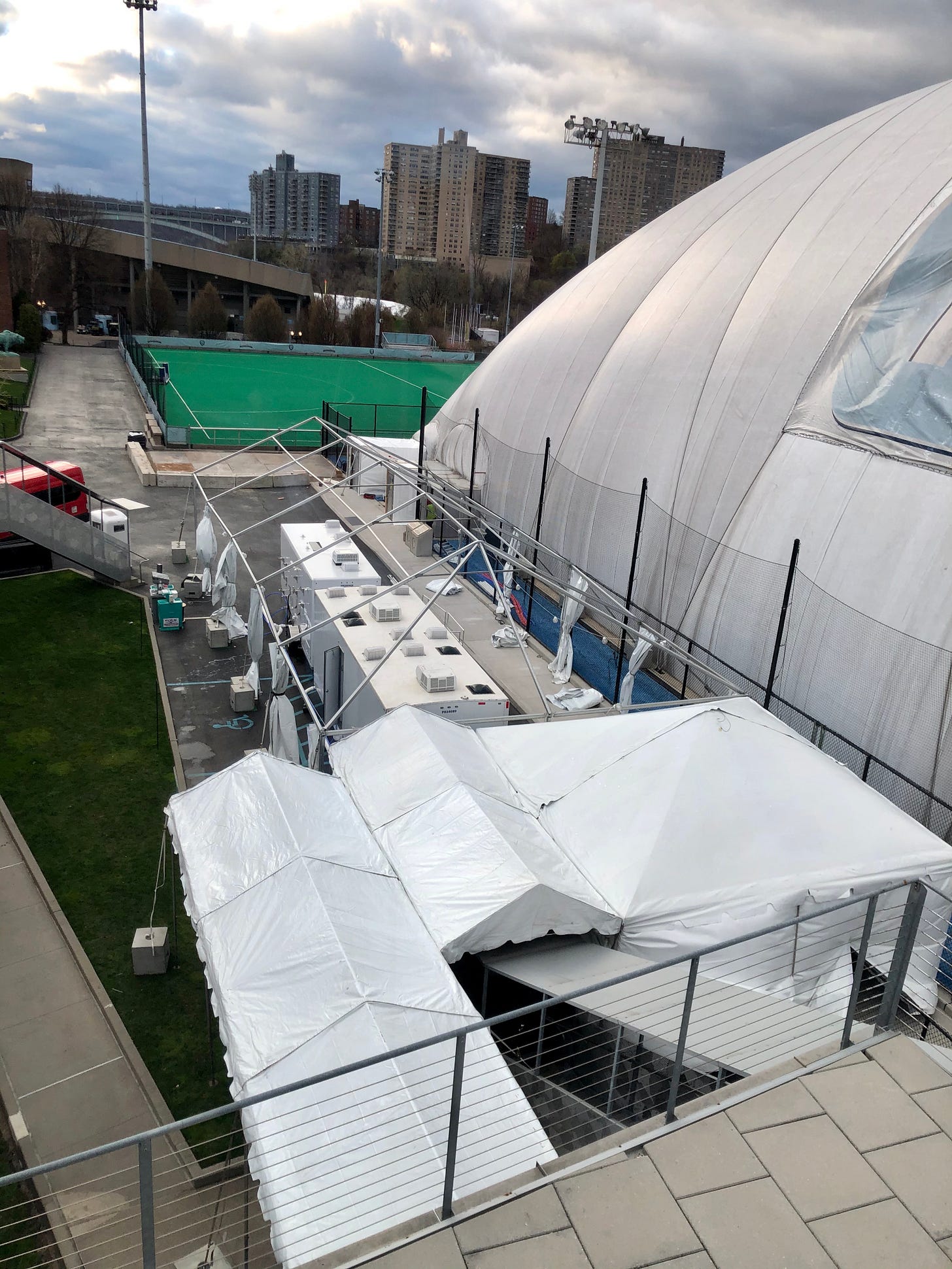
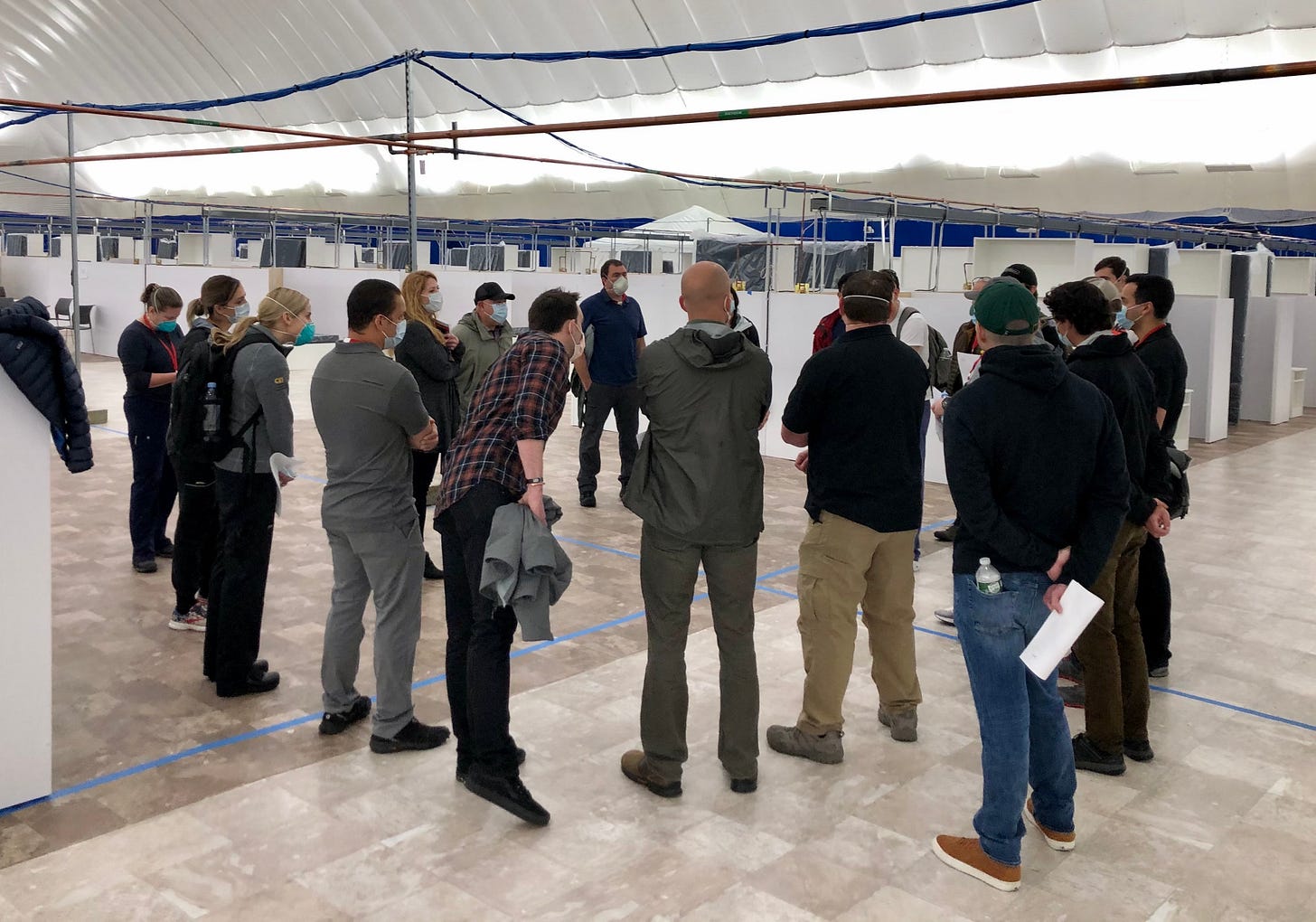
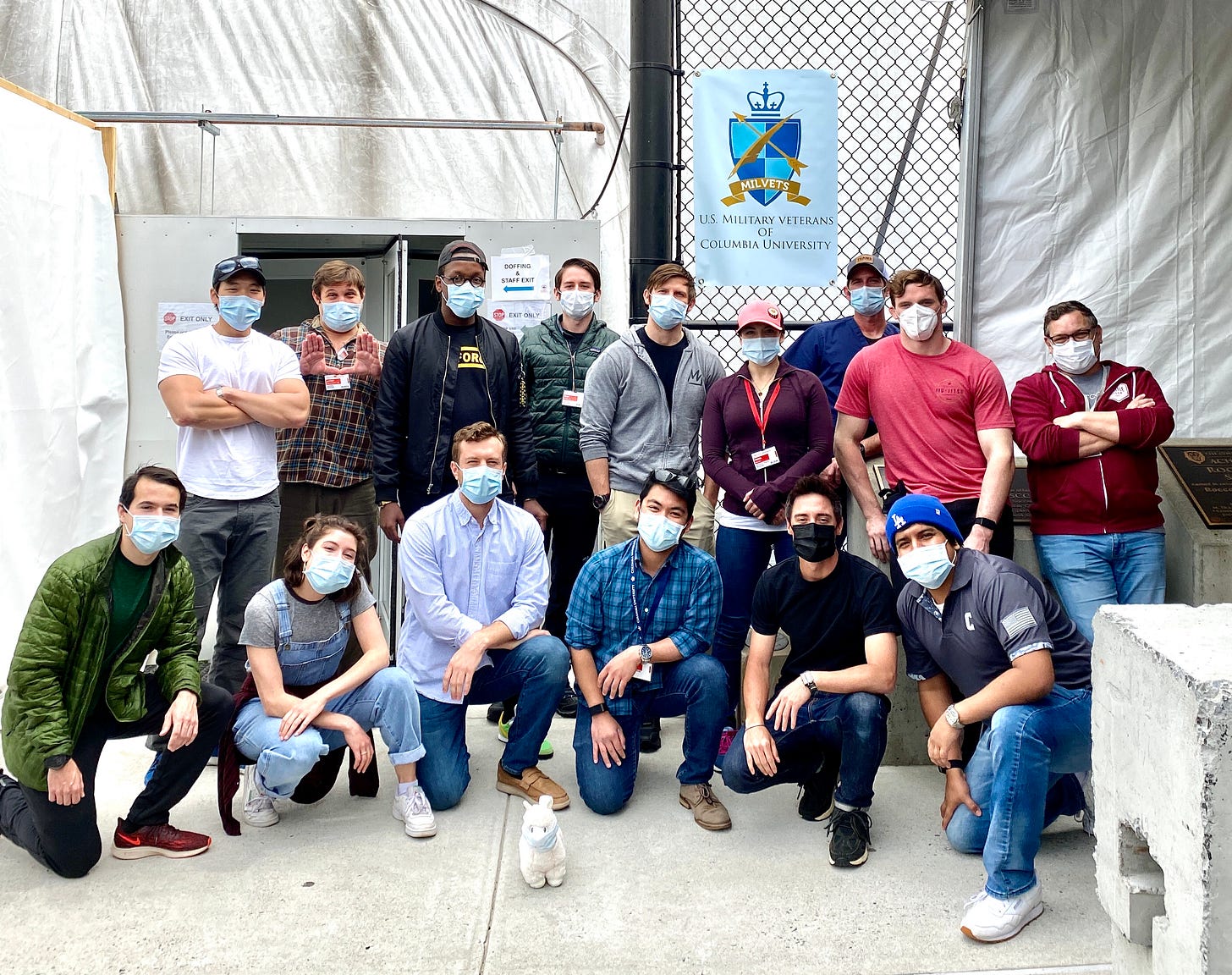
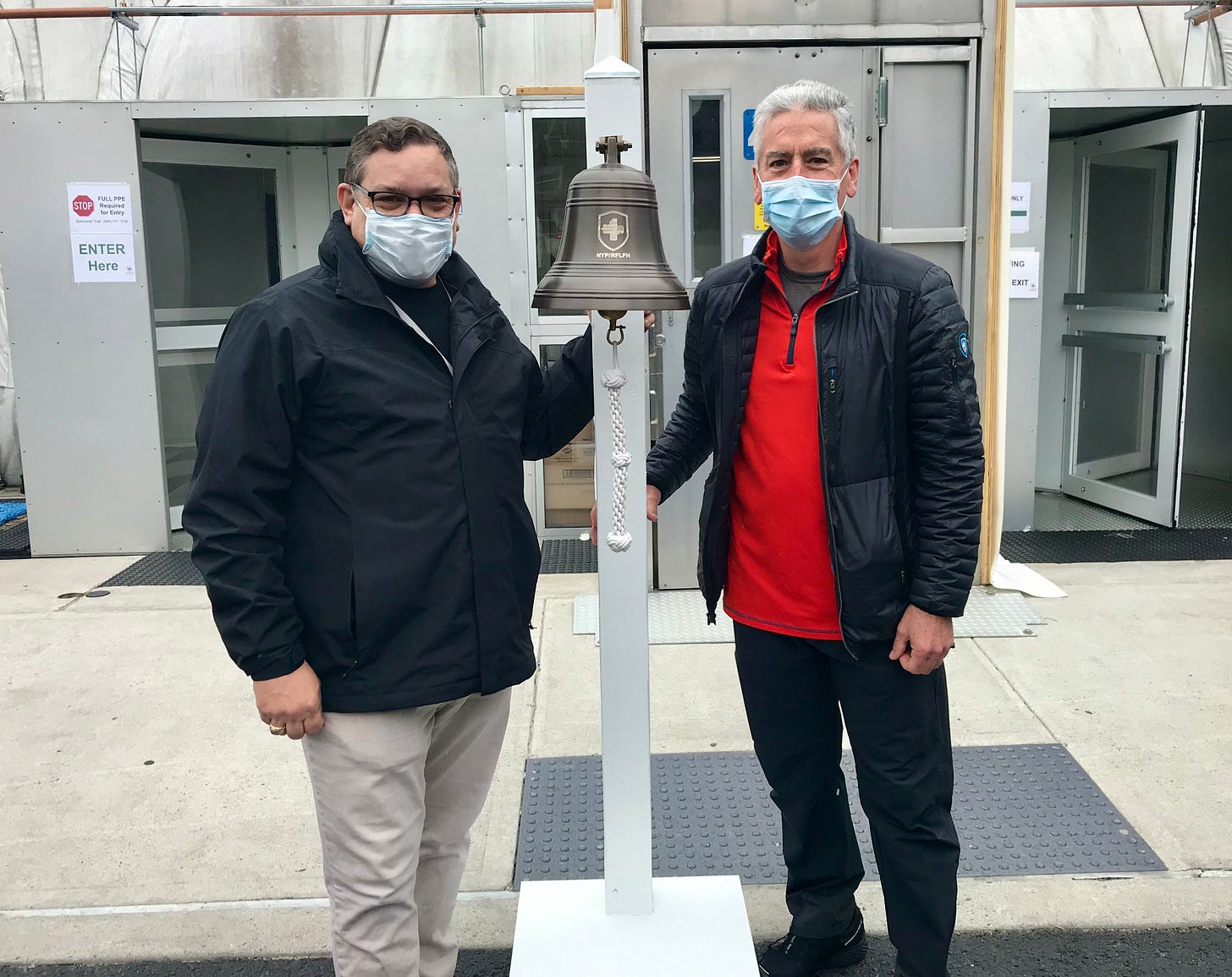
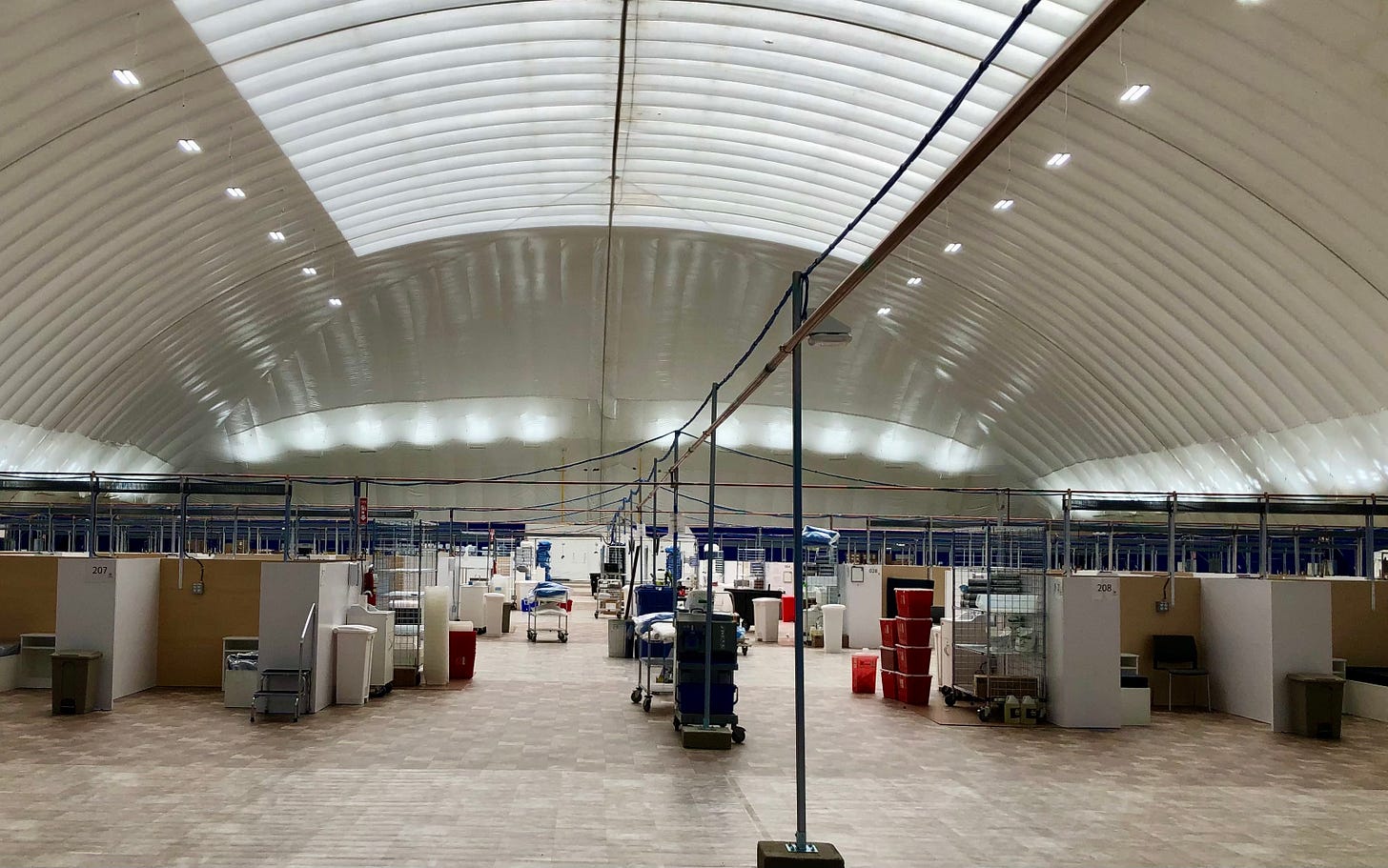
I cried all the way through this incredible account of humanity at its unparalleled height of heroism. My only child, who worked in an ER in a smaller, highly dysfunctional, branch of a UPMC hospital, took her life last September. UPMC never even bothered to put up a plexiglass barrier for the first contact admissions people during covid. Mgmt talked about it, but that was all. Unbelievable!! We will never know if she had a brain disturbance, perhaps from a pre-vaccine bout of covid, or an overwhelming depression, as she jumped into Niagara Falls. Her body was found 27 days later, so an autopsy was impossible. We texted or talked almost every day, but she never expressed the tragic depths of her despair. This piece drives home the lesson that kindness isn't a cure, but it sure as hell is paramount to navigating a pandemic. I will not forgive or forget those who went out of their way to make this tragedy even more unbearable than it was. As a deeply spiritual human being I wish them no harm, but shun them as an unsavory vexation to the spirit.
Amazing story, Mr. Wellman--thank you for your service once again!